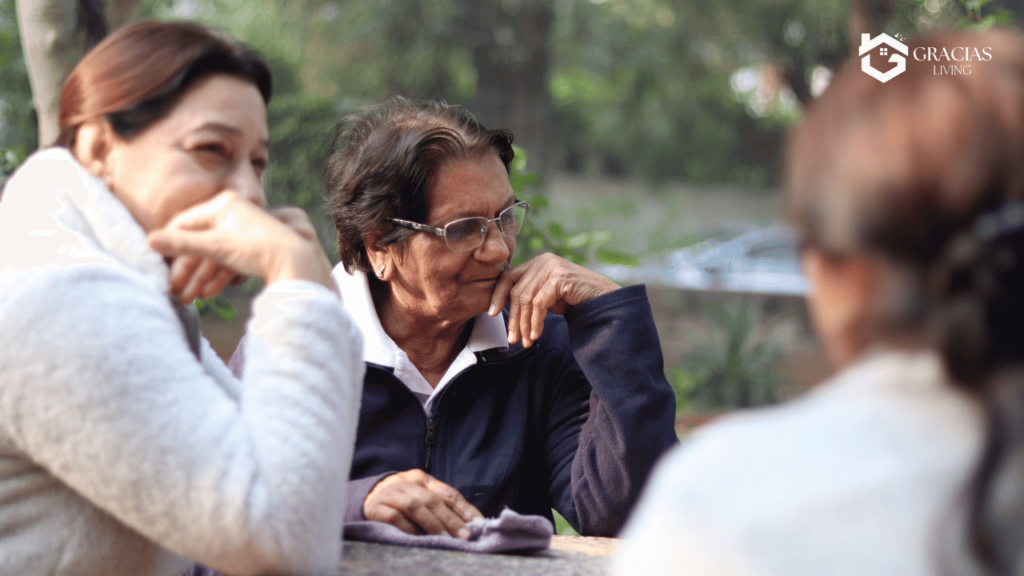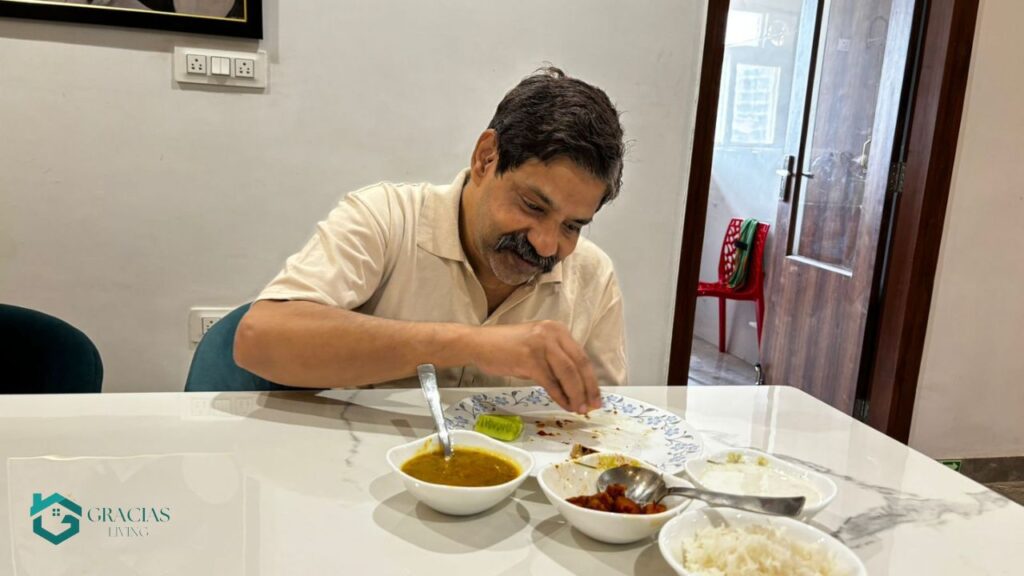Quick Summary of the article:
- As people age, it becomes increasingly important to prioritize their health and consume nutrient-rich foods.
- Elderly people have unique dietary and lifestyle requirements that require careful attention to ensure a high quality of life.
- For Elders,it’s essential to stay sufficiently hydrated to balance electrolytes, maintain normal blood volumes, and aid nutrient transportation with a tailored approach.
- Elderly care homes integrate holistic wellness activities into the daily routine, motivating seniors to engage in gentle exercise, meditation, and recreational activities.
- By prioritizing nutritional diet and well-being activities, elderly care homes emerged as a helping hand for the older people to live a fulfilling life.
As people age, it becomes increasingly important to prioritize their health and consume nutrient-rich foods.
This is because the aging process comes with various changes in the body, and a lack of necessary nutrients can lead to deficiencies, poor health outcomes, and reduced quality of life. However, it’s never too late to make positive changes and support a healthy lifestyle.
To be honest, every individual has unique dietary and lifestyle requirements that require careful attention to ensure a high quality of life, especially when it comes to elderly people.
And luckily, in a rat race era, elderly care homes have come forth as a valuable resource and a great community to help them live life the way they desire.
So, let’s delve into the guide to healthy aging, where focusing on nutritional value and wellness activities emerged as the cornerstones of a fulfilling life.

Nutrition and wellness: The key to a healthy life
1. Maintain a balanced diet:
Aging brings about several physiological and immunological changes that impact the nutritional requirements of individuals, particularly elderly people.
Therefore, a balanced diet is crucial, with a focus on limiting saturated fats, animal-based proteins, and simple carbohydrates.
The daily intake should include cereals, fruits, vegetables, pulses, and dairy products in moderation. It’s also essential to remain hydrated to avoid digestive issues, making healthy food the best way for seniors to obtain the nutrients they need.
2. CALCIUM AND VITAMIN D
Calcium and vitamin D are needed to help maintain bone health, so is are important nutrients among older adults.
Having three servings of calcium-rich foods and beverages each day is recommended, so serving food such as fortified cereals and fruit juices, dark green leafy vegetables like kale and spinach, canned fish, milk, and fortified plant beverages like soya milk is advised. Taking calcium supplements or multivitamins which contain vitamin D.

3. VITAMIN B12
Vitamin B12 is a nutrient that helps keep the body’s nerves and blood cells healthy and also helps prevent a type of anemia called megaloblastic anemia that makes people tired and weak.
To ensure residents do not suffer from vitamin B12 deficiency, ensure they are getting the nutrients they need.
Serve lean meat and canned fish such as tuna and salmon at mealtimes. For residents who stick to a vegan or vegetarian diet, nutritional yeast and non-dairy milk a good sources of vitamin B12.
4. Water and fiber intake:
Several physiological changes can put seniors at risk of dehydration, such as diminishing kidney function and a reduced sense of thirst.
Thus, it’s essential to stay sufficiently hydrated to balance electrolytes, maintain normal blood volumes, and aid nutrient transportation with a tailored approach.
Additionally, fiber intake should increase to aid digestion and prevent constipation. Therefore, incorporating plant-based foods into a balanced diet is a reliable way to help seniors meet their fiber needs.
5. Customized diets:
In an era where change has become a constant thing, personalization has emerged as a source of optimism. When it comes to meeting the dietary needs of the elderly, this method can work miracles.
This is where elderly care homes focus on personalized nutrition plans to make them feel well and affluent, ensuring residents receive meals adapted to their specific health needs, dietary restrictions, allergies, and preferences.
This personalized treatment results in improved health outcomes and a more pleasurable dining experience.
6. Holistic wellness activities:
Alongside nutrition, wellness activities play a vital role in maintaining a healthy lifestyle.
Therefore, elderly care homes integrate holistic wellness activities into the daily routine, motivating seniors to engage in gentle exercise, meditation, and recreational activities. This comprehensive approach ensures residents experience a fulfilling and balanced lifestyle.
Towards a healthy life!
There is no denying the fact that aging is a biological process that requires different nutritional intake and wellness activities at different stages.
Choosing healthy foods and nutritional resources can help people make every bite count, regardless of age.
Therefore, by prioritizing nutritional diet and well-being activities, elderly care homes emerged as a helping hand for older people to live a fulfilling life.
Conclusion
A good meal is often used to provide comfort, celebrate success, nurture companionship, and even mark welcomes and goodbyes and celebrations such as birthdays. Making mealtimes a social occasion will benefit the residents and staff alike, as they are a pivotal point for the delivery of care, so the benefits should not be overlooked.
Not only do mealtimes offer the chance for residents to establish emotional and psychological connections with other residents, set meal times also establish a sense of familiarity and routine.
Frequently Asked Questions
1. What is an important aspect of healthy ageing?
Nutrition and wellness are essential to the mechanics of healthy ageing! It is a perfect diet that is full of all the necessary vitamins like Calcium, Vitamin D and B12, hydration and complete wellness to make you physically and mentally strong.
2. What are the three powerful steps towards healthy ageing?
Three of the greatest ones are: 1) a well-balanced and healthy, nutritious diet that contains vital vitamins and minerals. 2) Ensuring that you are consuming much water and fibre, lubricating the engine. 3) Whole person wellness activities – e.g. light exercise and meditation.
3. How can elderly care facilities promote healthy ageing?
Some of the largest include: 1) A proper and balanced, healthy, nutritious diet with important vitamins and minerals. 2) Make sure that you are filling up on water and fibre to lubricate the engine. 3) Whole person wellness skills – e. e. light exercise and meditation.
4. How does diet affect healthy ageing?
The profound influence of diet on healthy ageing is that it provides fundamental nutrients such as Calcium, Vitamin D and B12 needed within the body so as to maintain bone density, nerve activity and energy. A poor diet has you dragging along a lack of nutrients and tiredness, good nutrition has you soaring to a long life and the prevention of sickness.
5. What role does mental health play in healthy ageing?
The most important one is mental health, which is the well-being and brain cognition. Socialisation, connection, and practices like meditation and play are among the paths to nurturing mental wellness and shunning loneliness, defeating the influence of depression, and living a life of worth.




